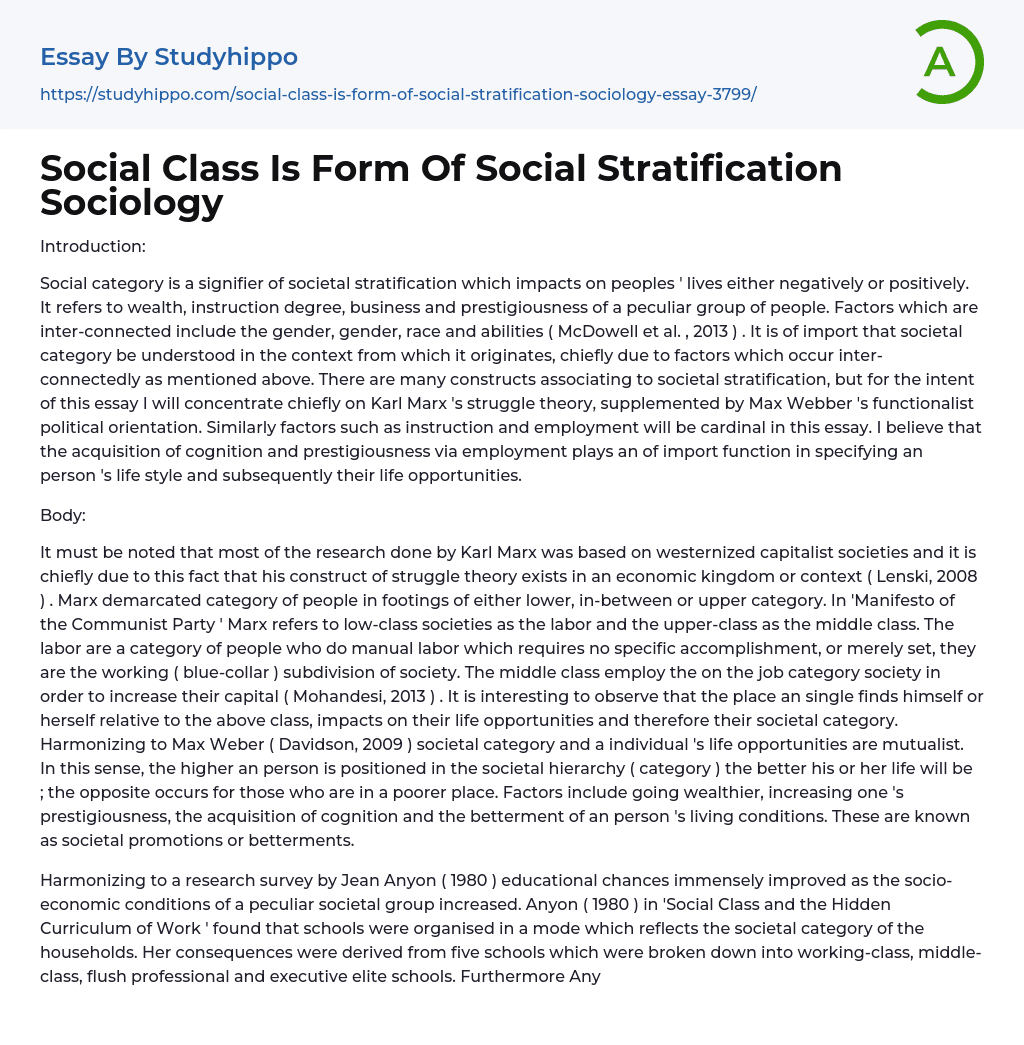

Social Class Is Form Of Social Stratification Sociology Essay Example
Introduction:
Social category, including wealth, education level, occupation, and prestige, impacts people's lives positively or negatively. This concept is interconnected with factors such as gender, race, and abilities (McDowell et al., 2013). Understanding the origin and interconnectedness of societal class is crucial. This essay will primarily focus on Karl Marx's conflict theory supplemented by Max Weber's functionalist ideology. Additionally, education and employment are key factors to be discussed. Acquiring knowledge and prestige through employment significantly shapes an individual's lifestyle and future opportunities.
Body:
It is worth noting that Karl Marx conducted most of his research in Western capitalist societies, which influenced his concept of conflict theory within an economic context (Lenski, 2008). Class divisions according to Marx include lower, middle, and upper classes. In the "Manifesto of the Communist Party," Marx refers to the w
...orking class as labor and the bourgeoisie as the middle class.The labor category refers to individuals who perform manual labor without requiring specific qualifications or skills - they are the blue-collar workers of society. The middle class employs this working category in order to increase their wealth. It is worth noting that a person's position within this class affects their life opportunities and social standing. According to Max Weber, social class and an individual's opportunities in life are interconnected. Those who hold higher positions in the social hierarchy experience better quality of life, while those in lower positions face disadvantages. Factors that contribute to social advancement include accumulating wealth, gaining prestige, acquiring knowledge, and improving living conditions. These advances are known as social promotions or improvements. Jean Anyon's research study, "Social Class and the Hidden Curriculum of Work," revealed that educational opportunities
greatly improve as the socioeconomic conditions of a particular social group increase. Anyon's study observed five schools categorized as working-class, middle-class, affluent professional, and executive elite schools, each reflecting the social class of the families they serve.Anyon (1980) argues that children from higher social groups have access to accomplishments and knowledge that lead to societal power or prestige, whereas the working class is offered a practical curriculum that limits their opportunities. This research emphasizes that schools cater to each social class, preparing students for employment within their own societal category. Lower class schools prioritize obedience rather than individual initiative and understanding of the work. The focus on individuality increases in schools with higher social class. I personally agree with Anyon's findings, as there are various types of institutions ranging from technical to professional and managerial, such as Cape Peninsula University of Technology, Cape Town College, and The University of the Western Cape. Marx also argues that institutions are used to control the subordinates in society, which aligns with Anyon's research and presents a grim image. Institutions shape and socialize individuals from a young age to conform to societal strata. Education ultimately leads to employment, which in turn leads to wealth or material possessions.According to Max Weber, owning physical assets obtained through production creates distinct opportunities in an individual's life (Shortell, 2012). Weber also believes that ownership of property is crucial for class distinctions, resulting in relationships between employees and employers or property tenants and owners. In our capitalist society driven by neoliberalism, emphasis is placed on wealth acquisition, leading to social stratification between the upper class and the lower class. One can improve their social
class by gaining wealth and owning property, making this a more open system compared to slavery. Employment provides an opportunity to achieve wealth and increase social status, although inequalities exist where even a skilled bread baker has fewer chances to improve their conditions compared to the bakery owner. Functionalists (Marxism) argue that economic disparity benefits the majority of society and is essential for societal functioning as a whole (Lenski, 2008).
Conclusion:
In my opinion, employment represents the second stage of a three-stage process in terms of an individual's life opportunities.The main point of my statement is that the level of instruction provided to individuals varies based on their socio-economic status. This is crucial because institutions shape society in preparation for their predetermined future, which is influenced by external forces beyond their control. In an open capitalist society, there exists a false belief that all labor has equal opportunities to improve their lives. However, the truth is that individuals from higher social classes have more access to success, prestige, wealth, knowledge, and ultimately better chances in life.
- Culture essays
- Social Control essays
- Citizenship essays
- Social Justice essays
- Caste System essays
- Social Responsibility essays
- Socialization essays
- Deviance essays
- Modern Society essays
- Popularity essays
- Civil Society essays
- Community essays
- Female essays
- Filipino People essays
- Igbo People essays
- Indigenous Australians essays
- Indigenous Peoples essays
- Minority Group essays
- Social Institution essays
- Men essays
- The nation essays
- Middle Class essays
- Social Norms essays
- Discourse Community essays
- Popular Culture essays
- Car Culture essays
- American Culture essays
- Mormon essays
- Indian Culture essays
- Mexican Culture essays
- Pop Culture essays
- Cultural Differences essays
- Culture Shock essays
- Different Cultures essays
- Anthropology essays
- Audience essays
- Charity essays
- Cultural Competence essays
- Emile Durkheim essays
- Gender Roles essays
- Generation essays
- Globalization essays
- Interpersonal Relationship essays
- People essays
- Race essays
- Social Change essays
- Social Class essays
- Social Movement essays
- Social Science essays
- Social Status essays



